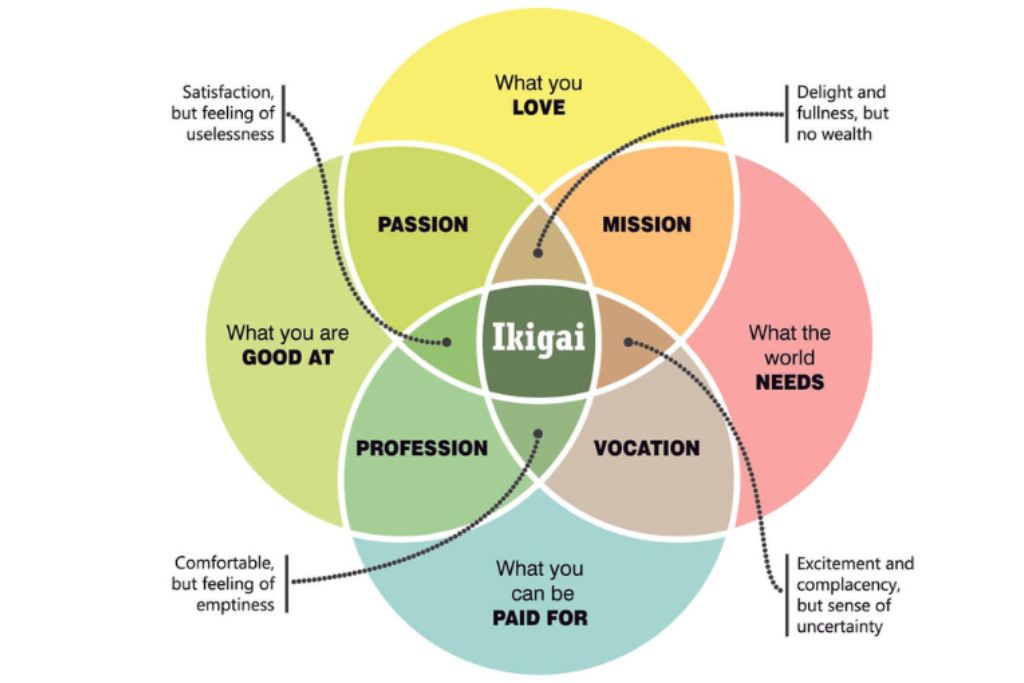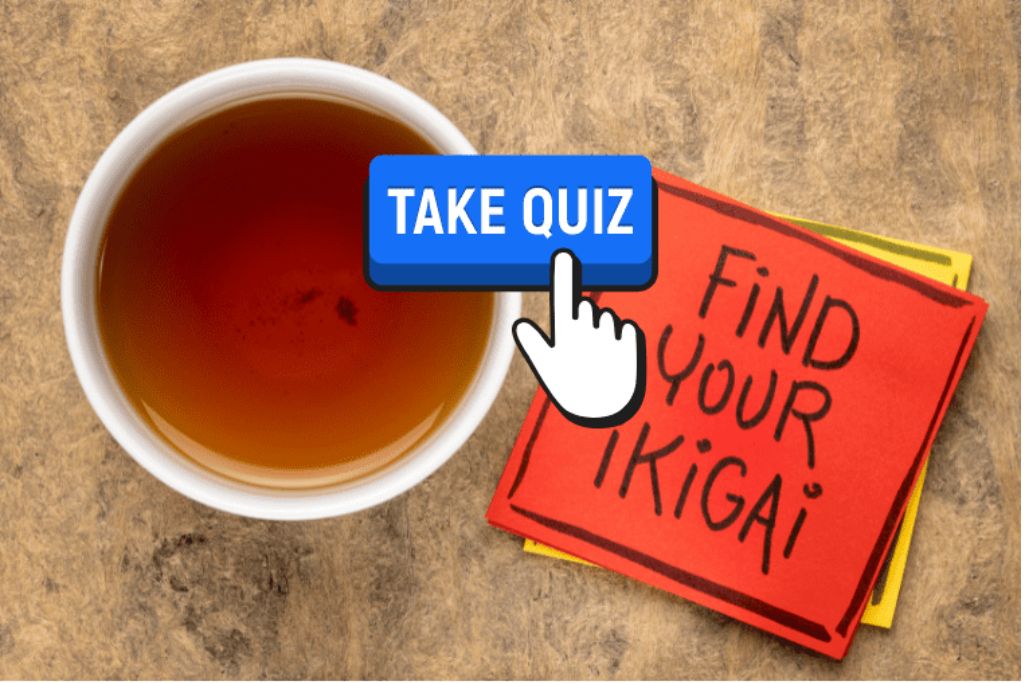
Choosing a college major is one of those decisions that will stick with you for the rest of your life and the afterlife as well.
This simple question often brings many options to imagine and fantasize about how your life would look like in the future – The truth is that nobody really knows!
Would you choose the major that maximizes your future income?
Do you even know what would that be? Or would you choose what you are good at? Or what makes you happy?
It is really a complicated decision once you start thinking about what it takes to live a happy life ever after, all factors taken into consideration.
IKIGAI is about aligning your inner self with the outer world; therefore, helping you dig deeper to find an accurate answer and choose the major for your life purpose.
In this blog post, we’ll explore how to use the principles of IKIGAI to select a college major that not only matches your passions and skills but also sets you on a path toward a fulfilling and purpose-driven life.

What is IKIGAI?
IKIGAI is a Japanese concept that translates to “reason for being” or “what you live for.” It embodies the idea of finding purpose and fulfillment in life by aligning your passions, skills, and values with your daily tasks and goals. The term “IKIGAI” is derived from two Japanese words: “IKI,” meaning life, and “GAI,” meaning worth or value.
At its core, IKIGAI is about discovering what makes life meaningful and satisfying. It encourages individuals to explore their interests, strengths, and what they can contribute to the world. By integrating these elements, IKIGAI helps people identify their unique purpose and direction, leading to a more fulfilling and balanced life.
The relevance of IKIGAI extends to various aspects of life, including Potential Career Paths, personal relationships, and overall well-being. It provides a framework for evaluating decisions and setting goals that align with your true self. For example, when choosing a college major, applying the principles of IKIGAI can help you find a field that not only matches your abilities and interests but also contributes to a sense of purpose and satisfaction.
By embracing IKIGAI, you can gain deeper insight into what truly motivates and inspires you, helping you make more informed and fulfilling choices in both your personal life and professional goals.
Finding Your Ideal College Major Through Four Key Questions
IKIGAI is a popular Japanese concept that loosely translates into “the reason for being” or “a thing you live for” – basically, the things you wake up for in the morning.
The concept of IKIGAI sheds light on a list of questions you ought to ask yourself when trying to look for happiness while making a life-changing decision.
- What do you love and feel passionate about?
- What are you good at?
- What does the world need?
- What can you get paid for?
As a high school student looking to go into college and start your lifelong career path, it is important to find answers to these questions to be able to choose a college major or study area that will make you happiest.
IKIGAI shows that to live a happy life, your future college major should be based on some balance between what you love, what you are good at, what the world needs, and what you can be paid well for.
Only when you find balance between the answers you gave to each question, your choice for a college major would aim towards a more fulfilling and balanced life in the future. By considering these factors, you gain valuable insights that help guide you toward a decision that aligns with your passions, skills, and the needs of the world.
Each of the four aspects depicted in the diagram above represents an open-ended question.
Finding your IKIGAI requires that all four circles intersect, or in other words, you find reasonable “overlapping” answers to all four questions.
The first two questions are internal and have to do with you and your passions in life; hence, easier to find answers to, while the other two questions are external and relate to the world around you.
Let us look at each of the 4 questions and explore what type of answers we can get.
What do you love and feel passionate about?

It’s important for you to identify what you love and what your passions are. Those are the things that bring you happiness when you do them. We are not talking about school subjects here. Rather, they could be your hobbies or the things you enjoy doing. Your passions usually start shaping up at an early age but they become clearer to you as you progress to your teen years.
For example, do you love or enjoy arts or music? Or are you more of a social animal who loves being around people? Is there a specific sport you love watching? Are you into cars, fashion, graphic design, technology, or literature? Try to identify the things you do in order to feel happy!
What Are You Good At?

What is your edge? Is it writing? Debating? Are you able to fix things easily? Are you good at puzzles? Math? Physics? Those are your skills, abilities, talents, or academic subjects that you are naturally good at.
it is not always necessary to love what you are good at; if you do, that would be a plus. You might be good at debating and not have the desire to debate. Similarly, you might be good at accounting major, and just not like it!
For the same reason, there has always been a direct relationship between what we love and what we are good at.
If you have been good with computers, for example, and you have a passion for solving software or hardware issues, a major in computer engineering or computer science might be good for you. These majors will guarantee that you spend the rest of your career working with computers.
Do not be discouraged yet about the things you are not good at but love.
There is a great chance that you can train yourself and develop those skills if you are passionate about it. However, natural talents and abilities are far more powerful than acquired ones because they are more innate to your nature.
In summary, the first two questions can go together, but it is not necessary. If there is something you are good at; you love doing that thing. But if you love something, it is not necessary that you are good at it. You still can teach yourself things that you love but not very well at. However, the things that you are naturally good at are more valuable to align your future career goals with.
If you are not sure about how to identify such aspects of your life or if you do know what you are good at but unsure about the major to choose; feel free to book your free consultation now.
What Does the World Need?

This question and the next one relate to the external world around you, as opposed to the first 2 questions which relate to yourself, your passions, and talents.
Knowing what the world needs might not be as easy as answering what you love or what you are good at especially for sixteen or seventeen years old who might not be fully familiar with what the world needs.
To answer this question, you might need to do some research or consult an educational or career counselor. You can schedule a consultation with one of Studygram’s counselors to guide you in this process.
Try to identify what makes the world as it is now a better place. There are endless opportunities out there for improving the world. From technology to medicine, to food security and poverty reduction, or environmental conservation. Check our blog post Top college majors to consider in the post COVID-19 world to get some inspiration.
See if your passion can be used and developed into a career that helps give back to society. Don’t hesitate to ask professionals in fields that are closely related to your passion; you will be amazed at how useful insights collected from people around you, are to you.
What Can You Get Paid For?

The last question in the IKIGAI quadrant is as important as the first 3 questions. You clearly need to be able to get paid!
This question can be rephrased into the following: How can you do what you love and have a talent for at the same time it is good for the world and people value and are willing to pay for it. In other words, you need to identify what people value that brings goodness to society, which you are good at and love.
For example, if you love arts and you are good at drawing painting, or even math or geometry, you might want to consider majoring in sustainable or green architecture and designing buildings and cities that are good towards nature and beautiful at the same time. Both people and nature would love it!
If you like to fix things and you have a talent for mathematics, engineering might be good for you. What field of engineering is good for you would depend on answering the four questions fully over and over again in different ways. If your passion lies within languages and writing, a major in journalism or communications may give you a great career.
Take some time alone to contemplate the four IKIGAI questions. Write on a piece of paper any ideas or keywords that would fall within each of the four diagram circles. Write close and far variations of these keywords, and reflect on how they are connected and you can combine them in different ways. Leave this paper on your desk and take a walk. Go meet your friends or your mentors, and do your things. Then, come back to this piece of paper and revise, re-write it, change it if you wish, and start over again.
Remember that this process is not linear; which means you will need to go back and forth over your options more than once. Identify your strong points and try to develop them as you progress in life.
Answering two or three questions is good but finding the answers to all four questions should be your goal. Choosing the right college major would make all the difference in finding your IKIGAI as it may mean a long, meaningful, and happy career life.
The Convergence Zone: Where Your Passions and Professions Meet

Finding your ideal college major involves identifying where your passions, skills, societal needs, and financial goals intersect. This convergence zone represents the optimal point where personal fulfillment, professional abilities, societal impact, and financial stability align.
To identify this overlap, start by listing what you love, what you’re good at, what the world needs, and what you can get paid for. Look for intersections where these factors meet. For example, if you are passionate about environmental science, skilled in analytical thinking, recognize a growing need for sustainable solutions, and find job opportunities in this field, you’ve found a promising major.
Once you identify this overlap, create a balanced career plan by selecting a major that aligns with these elements. Engage in internships, volunteer work, or part-time jobs related to this field to gain practical experience. Continuously reflect on your experiences and adjust your path as necessary. Be open to reassessing your goals based on new insights and experiences to ensure your career plan remains fulfilling and practical.
Take the quiz to discover which areas of study align best with the Japanese philosophy of IKIGAI. After taking the quiz, you will know the best major suited for you. Studygram will help you choose the best university for your selected major.

Selecting the right college major involves answering four key questions from the IKIGAI philosophy: What do you love? What are you good at? What does the world need? What can you get paid for? These questions are essential for identifying a major that aligns with your passions, strengths, societal needs, and financial goals.
By exploring these areas, you can find the intersection where they overlap, leading to a balanced and fulfilling decision.


